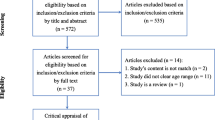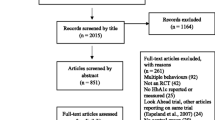Abstract
BACKGROUND
African-American women are disproportionately affected by obesity. Weight loss can occur, but maintenance is rare. Little is known about weight loss maintenance in African-American women.
OBJECTIVES
(1) To increase understanding of weight loss maintenance in African-American women; (2) to use the elicitation procedure from the theory of planned behavior (TPB) to define the constructs of attitude, subjective norms, and perceived behavioral control regarding weight loss and maintenance; and (3) to help develop a relevant questionnaire that can be used to explore weight loss and maintenance in a large sample of African Americans.
DESIGN
Seven focus groups were conducted with African-American women: four with women successful at weight loss maintenance, three with women who lost weight but regained it. Discussions centered on weight loss and maintenance experiences.
PARTICIPANTS
Thirty-seven African-American women.
APPROACH
Content analysis of focus group transcripts.
RESULTS
Weight loss maintainers lost 22% of body weight. They view positive support from others and active opposition to cultural norms as critical for maintenance. They struggle with weight regain, but have strategies in place to lose weight again. Some maintainers struggle with being perceived as sick or too thin at their new weight. Regainers and maintainers struggle with hairstyle management during exercise. The theoretical constructs from TPB were defined and supported by focus group content.
CONCLUSIONS
A weight loss questionnaire for African Americans should include questions regarding social support in weight maintenance, the importance of hair management during exercise, the influence of cultural norms on weight and food consumption, and concerns about being perceived as too thin or sick when weight is lost.

Similar content being viewed by others
Reference
Flegal KM, Carroll MD, Ogden CL, Johnson CL. Prevalence and trends in obesity among US adults, 1999–2000. JAMA. 2002;288(14):1723–7.
Mokdad AH, Ford ES, Bowman BA, et al. Prevalence of obesity, diabetes, and obesity-related health risk factors, 2001. JAMA. 2003;289(1):76–9.
Paeratakul S, Lovejoy JC, Ryan DH, Bray GA. The relation of gender, race and socioeconomic status to obesity and obesity comorbidities in a sample of US adults. Int J Obes Relat Metab Disord. 2002;26(9):1205–10.
Mensah GA, Mokdad AH, Ford ES, Greenlund KJ, Croft JB. State of disparities in cardiovascular health in the United States. Circulation. 2005;111(10):1233–41.
Mack KA, Anderson L, Galuska D, Zablotsky D, Holtzman D, Ahluwalia I. Health and sociodemographic factors associated with body weight and weight objectives for women: 2000 behavioral risk factor surveillance system. J Womens Health (Larchmt). 2004;13(9):1019–32.
Kumanyika SK, Obarzanek E, Stevens VJ, Hebert PR, Whelton PK. Weight-loss experience of black and white participants in NHLBI-sponsored clinical trials. Am J Clin Nutr. 1991;53(6 suppl):1631S–8S.
Tyler DO, Allan JD, Alcozer FR. Weight loss methods used by African American and Euro-American women. Res Nurs Health. 1997;20(5):413–23.
Nothwehr F. Attitudes and behaviors related to weight control in two diverse populations. Prev Med. 2004;39(4):674–80.
Karanja N, Stevens VJ, Hollis JF, Kumanyika SK. Steps to soulful living (steps): a weight loss program for African-American women. Ethn Dis. 2002;12(3):363–71.
Martin PD, Rhode PC, Dutton GR, Redmann SM, Ryan DH, Brantley PJ. A primary care weight management intervention for low-income African-American women. Obesity. 2006;14(8):1412–20.
Ard JD, Rosati R, Oddone EZ. Culturally-sensitive weight loss program produces significant reduction in weight, blood pressure, and cholesterol in eight weeks. J Natl Med Assoc. 2000;92(11):515–23.
Elfhag K, Rossner S. Who succeeds in maintaining weight loss? A conceptual review of factors associated with weight loss maintenance and weight regain. Obes Rev. 2005;6(1):67–85.
Jeffery RW, Drewnowski A, Epstein LH, et al. Long-term maintenance of weight loss: current status. Health Psychol. 2000;19(1 suppl):5–16.
Stevens VJ, Obarzanek E, Cook NR, et al. Long-term weight loss and changes in blood pressure: results of the Trials of Hypertension Prevention, phase II. Ann Intern Med. 2001;134(1):1–11.
Walcott-McQuigg JA, Chen SP, Davis K, Stevenson E, Choi A, Wangsrikhun S. Weight loss and weight loss maintenance in African-American women. J Natl Med Assoc. 2002;94(8):686–94.
Young DR, Gittelsohn J, Charleston J, Felix-Aaron K, Appel LJ. Motivations for exercise and weight loss among African-American women: focus group results and their contribution towards program development. Ethn Health. 2001;6(3–4):227–45.
National Institutes of Health. Clinical guidelines on the identification, evaluation, and treatment of overweight and obesity in adults—the evidence report. Obes Res. 1998;6(suppl 2):51S–209S.
Ajzen I. The theory of planned behavior. Org Behav Human Decis Process. 1991;50:179–211.
Glanz K, Lewis FM, Rimer BK. Health Behavior and Health Education: Theory, Research, and Practice, 2nd ed. San Francisco, Calif.: Jossey-Bass; 1997 (Jossey-Bass health series).
Blue CL. The predictive capacity of the theory of reasoned action and the theory of planned behavior in exercise research: an integrated literature review. Res Nurs Health. 1995;18(2):105–21.
Godin G, Kok G. The theory of planned behavior: a review of its applications to health-related behaviors. Am J Health Promot. 1996;11(2):87–98.
Michels TC, Kugler JP. Predicting exercise in older Americans: using the theory of planned behavior. Mil Med. 1998;163(8):524–9.
Gatch CL, Kendzierski D. Predicting exercise intentions: the theory of planned behavior. Res Q Exerc Sport. 1990;61(1):100–2.
Povey R, Conner M, Sparks P, James R, Shepherd R. The theory of planned behavior and healthy eating: examining additive and moderating effects of social influence variables. Psychol Health. 2000;14:199–1006.
Conner M, Norman P, Bell R. The theory of planned behavior and healthy eating. Health Psychol. 2002;21(2):194–201.
Nguyen MN, Otis J, Potvin L. Determinants of intention to adopt a low-fat diet in men 30 to 60 years old: implications for heart health promotion. Am J Health Promot. 1996;10(3):201–7.
Backman DR. Psychosocial predictors of healthful dietary behavior in adolescents. J Nutr Educ Behav. 2002;34(4):184–192.
Peters RM, Aroian KJ, Flack JM. African American culture and hypertension prevention. West J Nurs Res. 2006;28(7):831–54; discussion 855–63.
Blanchard CM, Rhodes RE, Nehl E, Fisher J, Sparling P, Courneya KS. Ethnicity and the theory of planned behavior in the exercise domain. Am J Health Behav. 2003;27(6):579–91.
Wilcox S, Richter DL, Henderson KA, Greaney ML, Ainsworth BE. Perceptions of physical activity and personal barriers and enablers in African-American women. Ethn Dis. 2002;12(3):353–62.
Blixen CE, Singh A, Thacker H. Values and beliefs about obesity and weight reduction among African American and Caucasian women. J Transcult Nurs. 2006;17(3):290–7.
Davis EM, Clark JM, Carrese JA, Gary TL, Cooper LA. Racial and socioeconomic differences in the weight-loss experiences of obese women. Am J Public Health. 2005;95(9):1539–43.
Eyler AA, Baker E, Cromer L, King AC, Brownson RC, Donatelle RJ. Physical activity and minority women: a qualitative study. Health Educ Behav. 1998;25(5):640–52.
Wolfe WA. A review: maximizing social support—a neglected strategy for improving weight management with African-American women. Ethn Dis. 2004;14(2):212–8.
Eyler AA, Matson-Koffman D, Vest JR, et al. Environmental, policy, and cultural factors related to physical activity in a diverse sample of women: The Women’s Cardiovascular Health Network Project—summary and discussion. Women Health. 2002;36(2):123–34.
Carter-Edwards L, Bynoe MJ, Svetkey LP. Knowledge of diet and blood pressure among African Americans: use of focus groups for questionnaire development. Ethn Dis. 1998;8(2):184–97.
Airhihenbuwa CO, Kumanyika S, Agurs TD, Lowe A, Saunders D, Morssink CB. Cultural aspects of African American eating patterns. Ethn Health. 1996;1(3):245–60.
Nies MA, Vollman M, Cook T. African American women’s experiences with physical activity in their daily lives. Public Health Nurs. 1999;16(1):23–31.
Sanderson B, Littleton M, Pulley L. Environmental, policy, and cultural factors related to physical activity among rural, African American women. Women Health. 2002;36(2):75–90.
Henderson KA, Ainsworth BE. A synthesis of perceptions about physical activity among older African American and American Indian women. Am J Public Health. 2003;93(2):313–7.
Wolfe WA. Obesity and the African-American woman: a cultural tolerance of fatness or other neglected factors. Ethn Dis. 2000;10(3):446–53.
Baturka N, Hornsby PP, Schorling JB. Clinical implications of body image among rural African-American women. J Gen Intern Med. 2000;15(4):235–41.
Caldwell MB, Brownell KD, Wilfley DE. Relationship of weight, body dissatisfaction, and self-esteem in African American and white female dieters. Int J Eat Disord. 1997;22(2):127–30.
Krueger RA, Casey MA. Focus Groups: A Practical Guide for Applied Research, 3rd ed. Thousand Oaks, Calif.: Sage Publications; 2000.
Must A, Willett WC, Dietz WH. Remote recall of childhood height, weight, and body build by elderly subjects. Am J Epidemiol. 1993;138(1):56–64.
Perry GS, Byers TE, Mokdad AH, Serdula MK, Williamson DF. The validity of self-reports of past body weights by U.S. adults. Epidemiology. 1995;6(1):61–6.
Klem ML, Wing RR, McGuire MT, Seagle HM, Hill JO. A descriptive study of individuals successful at long-term maintenance of substantial weight loss. Am J Clin Nutr. 1997;66(2):239–46.
Wing RR, Phelan S. Long-term weight loss maintenance. Am J Clin Nutr. 2005;82(1 suppl):222S–5S.
Breitkopf CR, Berenson AB. Correlates of weight loss behaviors among low-income African-American, Caucasian, and Latina women. Obstet Gynecol. 2004;103(2):231–9.
Martin PD, Dutton GR, Brantley PJ. Self-efficacy as a predictor of weight change in African-American women. Obes Res. 2004;12(4):646–51.
Walcott-McQuigg JA, Sullivan J, Dan A, Logan B. Psychosocial factors influencing weight control behavior of African American women. West J Nurs Res. 1995;17(5):502–20.
Morgan DL. Focus groups as qualitative research, 2nd ed. Qualitative Research Methods Series 16. Thousand Oaks, Calif.: Sage Publications; 1997.
Railey MT. Parameters of obesity in African-American women. J Natl Med Assoc. 2000;92(10):481–4.
Centers for Disease Control and Prevention. Overweight and Obesity: Home. Available at http://www.cdc.gov/nccdphp/dnpa/obesity/. Accessed June 10, 2006; 2006.
Collins ME. Body figure perceptions and preferences among preadolescent children. Int J Eat Disord. 1991;10:199–208.
Harris SM. Racial differences in predictors of college women’s body image attitudes. Women Health. 1994;21(4):89–104.
Lawrence CM, Thelen MH. Body image, dieting, and self-concept: their relation in African-American and Caucasian children. J Clin Child Psychol. 1995;24(1):41–48.
Mayville S, Katz RC, Gipson MT, Cabral K. Assessing the prevalence of body dysmorphic disorder in an ethnically diverse group of adolescents. J Child Fam Stud. 1999;8(3):357–62.
Yates A, Edman J, Aruguete M. Ethnic differences in BMI and body/self-dissatisfaction among Whites, Asian subgroups, Pacific Islanders, and African-Americans. J Adolesc Health. 2004;34(4):300–7.
Liburd LC, Anderson LA, Edgar T, Jack L, Jr. Body size and body shape: perceptions of black women with diabetes. Diabetes Educ. 1999;25(3):382–8.
Acknowledgements
This work was supported by grant no. 5 K08 DK064898 (Dr. Barnes) from the National Institute for Diabetes and Digestive and Kidney Diseases.
Conflict of Interest
None disclosed.
Author information
Authors and Affiliations
Corresponding author
Rights and permissions
About this article
Cite this article
Barnes, A.S., Goodrick, G.K., Pavlik, V. et al. Weight Loss Maintenance in African–American Women: Focus Group Results and Questionnaire Development. J GEN INTERN MED 22, 915–922 (2007). https://doi.org/10.1007/s11606-007-0195-3
Received:
Revised:
Accepted:
Published:
Issue Date:
DOI: https://doi.org/10.1007/s11606-007-0195-3




